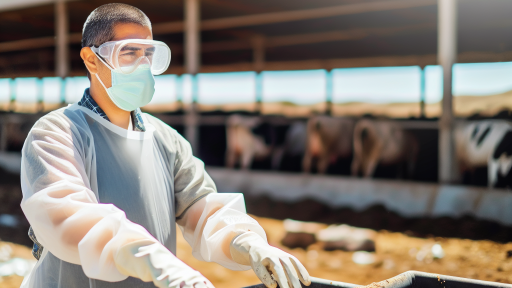Introduction to Genetics and Its Significance in Agriculture
Genetics plays a crucial role in agriculture.
It influences the quality of crops and livestock.
Farmers rely on genetic research to improve productivity.
This improvement optimizes breeding programs for animals.
Additionally, it enhances the nutritional value of food.
Understanding the Basics of Genetics
Genetics involves the study of genes and heredity.
Every organism inherits traits from its parents.
This inheritance affects traits such as growth and health.
In agriculture, genetics helps select desirable traits.
These traits may include disease resistance and yield.
The Impact of Genetic Selection on Meat Quality
Genetic selection is vital in producing high-quality meat.
Certain breeds may have better muscle development.
Other breeds might have superior fat deposition.
This selection directly affects meat tenderness and flavor.
Moreover, it influences how animals respond to feed.
Transform Your Agribusiness
Unlock your farm's potential with expert advice tailored to your needs. Get actionable steps that drive real results.
Get StartedTechnological Advances in Genetic Research
Recent advancements have revolutionized genetic research.
Techniques like genomics and CRISPR have emerged.
These tools enable precise modifications of genes.
As a result, breeders can target specific traits easily.
This progress accelerates the development of superior breeds.
Future Directions in Genetic Improvement
The future of genetics in agriculture is promising.
More research will likely enhance genetic variability.
It is expected to lead to improved sustainability practices.
Furthermore, consumers will benefit from higher-quality meat.
Ultimately, genetics will play a key role in food security.
Overview of Meat Quality Characteristics Influenced by Genetics
Understanding Meat Quality
Meat quality significantly impacts consumer preferences and market value.
It encompasses factors such as tenderness, flavor, and juiciness.
Genetics plays a crucial role in determining these qualities in meat animals.
Key Quality Traits Influenced by Genetics
Several key traits for meat quality are genetically determined.
Tenderness is one of the most sought-after quality attributes.
Genetic variations in muscle structure influence tenderness levels.
Flavor is another important characteristic shaped by genetic factors.
Fat deposition and muscle composition affect the flavor profile.
Moreover, juiciness is linked to fat content and water-holding capacity.
Breeding Programs for Improved Quality
Breeding programs focus on enhancing desirable meat quality traits.
Selective breeding helps amplify specific genetic traits over generations.
These programs often assess performance data to identify superior stocks.
Furthermore, advanced technologies like genomics aid in precision breeding.
Meat Color and Visual Appeal
‘Meat color’ influences buyer perception and acceptance.
Showcase Your Farming Business
Publish your professional farming services profile on our blog for a one-time fee of $200 and reach a dedicated audience of farmers and agribusiness owners.
Publish Your ProfileGenetics determines characteristics like marbling and muscle pigment.
Marbling enhances flavor, tenderness, and perceived quality in beef.
Understanding the genetic basis allows producers to improve visual appeal.
Considerations for Future Research
Ongoing research is essential to uncover new genetic markers.
These markers may lead to enhanced quality traits in meat animals.
Collaboration among researchers, farmers, and geneticists is vital.
Ultimately, genetics holds the key to improving meat quality for consumers.
The Role of Breeding Programs in Enhancing Meat Quality Traits
Genetic Selection for Meat Yield
Breeding programs focus on genetic selection to improve meat yield.
They identify specific traits linked to higher meat production.
For example, traits such as muscle mass and growth rates are prioritized.
As a result, the overall meat yield increases significantly.
Enhancing Flavor and Tenderness
In addition to yield, breeding programs target flavor and tenderness.
These attributes are essential for consumer satisfaction.
Genetic markers are used to select animals with superior flavor profiles.
Furthermore, muscle structure and fat distribution play crucial roles in tenderness.
Improving Disease Resistance
Another critical aspect of modern breeding programs involves disease resistance.
Healthy animals lead to better meat quality.
By selecting for genetic resistance to common diseases, producers can reduce losses.
This selection also enhances animal welfare and productivity.
Utilizing Advanced Technologies
Advanced technologies are now integral to breeding programs.
Genomic methods allow for precise selection of desirable traits.
These technologies increase the efficiency of breeding efforts.
Additionally, they enable faster genetic improvements over generations.
Collaboration within the Industry
Successful breeding programs often involve collaboration across the industry.
Researchers, producers, and marketers work together to define priorities.
Such partnerships can lead to innovations in meat quality enhancement.
Moreover, sharing knowledge and resources helps in achieving common goals.
You Might Also Like: Goat Health Management Tips for Farmers
Genomic Selection and Its Impact on Meat Quality Improvement
Understanding Genomic Selection
Genomic selection utilizes genetic information to improve livestock breeding.
This method analyzes DNA markers associated with desirable traits.
Consequently, it allows breeders to select individuals with optimal meat quality.
Genomic data enhances accuracy in predicting performance traits.
As a result, the breeding process becomes more efficient and reliable.
Advancements in Meat Quality Traits
Genomic selection has facilitated improvements in several meat quality traits.
These traits include tenderness, marbling, and flavor profile.
Additionally, researchers focus on reducing fat content while maintaining flavor.
Enhanced consumer preferences drive these advancements in meat quality.
Modern techniques allow for quicker breeding cycles, yielding faster results.
Benefits of Genomic Selection in Meat Production
One significant benefit is the ability to produce high-quality meat consistently.
This approach also helps meet the increasing global demand for premium meat.
Showcase Your Farming Business
Publish your professional farming services profile on our blog for a one-time fee of $200 and reach a dedicated audience of farmers and agribusiness owners.
Publish Your ProfileUsing genomic markers accelerates the selection process.
Breeders can make informed decisions based on genetic potential.
Ultimately, this leads to improved profitability for meat producers.
Challenges and Considerations
Despite its benefits, genomic selection has challenges to address.
One key issue is the cost associated with genetic testing.
Additionally, integrating this technology into existing breeding programs requires substantial investment.
Furthermore, breeders must stay informed about rapidly evolving genomic techniques.
These challenges must be met to fully capitalize on genomic selection benefits.
The Future of Genomic Selection in Meat Quality
The future of genomic selection looks promising for meat quality improvement.
Innovations in biotechnology will likely enhance breeding capabilities further.
As genetic research advances, understanding of meat quality traits will improve.
Consequently, this progress will benefit both producers and consumers.
With ongoing research, expectations for meat quality can continue to rise.
You Might Also Like: Marketing Strategies for Selling Farmed Fish Successfully
Case Studies of Successful Genetic Interventions in Meat Production
Introduction to Genetic Interventions
Genetic interventions play a pivotal role in enhancing meat quality.
Breeding programs focus on desirable traits in livestock.
These traits significantly impact meat tenderness, flavor, and fat distribution.
Improving Beef Quality through Genetic Selection
A notable case study involves the American Angus Association.
They developed genetic selection programs aimed at improving marbling.
This initiative led to substantial increases in beef quality grade.
Furthermore, enhanced marbling elevates consumer satisfaction and market value.
Enhancements in Pork Production
The National Pork Board implemented genetic programs targeting meat quality.
They emphasized traits like lean muscle growth and fat reduction.
As a result, their genetic interventions reduced backfat thickness significantly.
This improvement has increased pork quality while meeting consumer preferences.
The Success of Poultry Genetic Advancements
Poultry genetics have seen remarkable advancements in recent years.
Companies like Cobb-Vantress focus on improving breast meat yield.
They utilize selective breeding to enhance meat quality traits.
Consequently, this led to higher market competitiveness and better profitability.
Future Directions in Meat Genetics
Looking to the future, exciting developments await in genetics.
Gene editing technologies, such as CRISPR, show great promise.
These technologies can create more resilient and productive livestock.
Moreover, they may lead to even greater improvements in meat quality.
Insights from Genetic Interventions
The case studies provide valuable insights into genetic interventions.
They illustrate how genetics can significantly enhance meat quality.
Continued investment in genetic research will benefit the meat industry.
This path ensures sustainability and meets consumer expectations.
Gain More Insights: Best Practices For Livestock Waste Management

Challenges and Controversies Surrounding Genetic Modification in Livestock
Public Perception and Consumer Concerns
Genetic modification in livestock often raises public concerns.
Consumers worry about potential health risks associated with genetically modified organisms.
Showcase Your Farming Business
Publish your professional farming services profile on our blog for a one-time fee of $200 and reach a dedicated audience of farmers and agribusiness owners.
Publish Your ProfileFurthermore, there are concerns over the environmental impact of modifying animal genetics.
Public trust in the agricultural industry may diminish due to misconceptions.
To address these fears, transparency in the research process is essential.
Ethical Implications of Genetic Modification
Ethical debates continuously surround genetic modification in livestock.
Some argue that altering animal genetics infringes upon natural selection.
Others express concerns about animal welfare in genetically modified species.
Advocacy groups often highlight the rights of animals in these discussions.
Addressing ethical dilemmas requires open dialogue among stakeholders.
Regulatory Challenges and Standards
Regulations governing genetic modification vary widely across countries.
Inconsistent standards can create challenges for international trade.
Additionally, regulatory bodies must keep pace with rapid advancements in genetic technology.
Streamlined and unified regulations may enhance industry stability.
Policies should prioritize consumer safety while fostering innovation.
Impacts on Traditional Farming Practices
The introduction of genetic modification often disrupts traditional farming methods.
Farmers may face pressure to adopt new technologies for competitiveness.
This transition can create rifts within agricultural communities.
Preserving traditional practices while embracing innovation is a complex challenge.
Collaboration between conventional and genetically modified farms can offer solutions.
Economic Considerations
Genetic modification can significantly impact livestock production costs.
While costs of genetic research and development may be high, benefits can outweigh them.
However, not all farmers can afford the latest genetic technologies.
This economic disparity may widen gaps between large and small farms.
Encouraging equitable access to genetic advancements is crucial for industry growth.
See Related Content: Sustainable Fencing Solutions for Sheep
Future Trends in Genetic Research and Meat Quality Enhancement
Advancements in Genomic Technologies
Genomic technologies are transforming genetic research in livestock.
These tools enable more precise selection and breeding of animals.
For instance, next-generation sequencing significantly reduces analysis time.
Moreover, researchers are developing genomic selection strategies to enhance traits.
These traits include tenderness, flavor, and overall palatability of meat.
Integration of Artificial Intelligence
Artificial intelligence (AI) is playing a crucial role in meat quality enhancement.
AI algorithms analyze genetic data to predict desirable traits more accurately.
This technology helps in making informed breeding decisions quickly.
Additionally, machine learning models improve the efficiency of breeding programs.
This results in accelerated development of superior meat products.
Focus on Animal Welfare
Genetic research increasingly prioritizes animal welfare in breeding programs.
Researchers advocate for breeding traits that promote better health and welfare.
This approach not only benefits animals but also enhances meat quality.
Healthy animals tend to produce higher-quality meat consistently.
Moreover, consumer demand for ethically produced meat drives these initiatives.
Consumer Preferences and Market Trends
Understanding consumer preferences shapes genetic research direction.
Showcase Your Farming Business
Publish your professional farming services profile on our blog for a one-time fee of $200 and reach a dedicated audience of farmers and agribusiness owners.
Publish Your ProfileThere is a growing demand for high-quality, safe, and sustainable meat products.
Companies are investing in genetic improvements that align with these trends.
For example, genetics can help produce leaner cuts with improved flavor.
This not only meets consumer desires but also boosts market competitiveness.
The Role of Global Collaboration
Global collaboration among researchers enhances meat quality improvement efforts.
International partnerships facilitate knowledge sharing and resource pooling.
Researchers from different countries contribute diverse genetic resources.
This diversity enriches breeding programs and accelerates advancements.
Ultimately, global collaboration leads to better meat quality on a worldwide scale.
The Importance of Sustainable Practices in Genetic Selection for Meat Quality
Understanding Sustainable Genetic Selection
Sustainable genetic selection improves animal welfare and meat quality.
This approach minimizes environmental impact on farming.
It also enhances economic viability for producers.
Benefits of Sustainable Practices
Sustainable practices lead to healthier livestock.
Healthy animals produce better quality meat.
Moreover, these practices increase overall farm productivity.
- Enhanced flavor and texture in meat
- Improved nutritional content
- Reduced use of chemicals and antibiotics
The Role of Genetic Diversity
Genetic diversity is vital for sustainable meat production.
Diverse genetics enhance resilience to diseases.
In addition, genetic diversity contributes to better adaptation to environmental changes.
Incorporating Technology in Genetic Selection
Technological advancements streamline the genetic selection process.
These innovations allow for precise identification of desirable traits.
Consequently, farms can increase efficiency and effectiveness in production.
- Use of genomic selection
- Integration of data analysis tools
- Application of bioinformatics for breeding strategies
Case Studies in Sustainable Practices
Numerous farms showcase successful implementation of sustainable genetic selection.
For instance, Green Meadows Farm uses pedigree analysis.
This method improved meat quality while maintaining ecological balance.
Similarly, Sunshine Livestock applied advanced breeding techniques.
This led to higher consumer satisfaction and loyalty.




